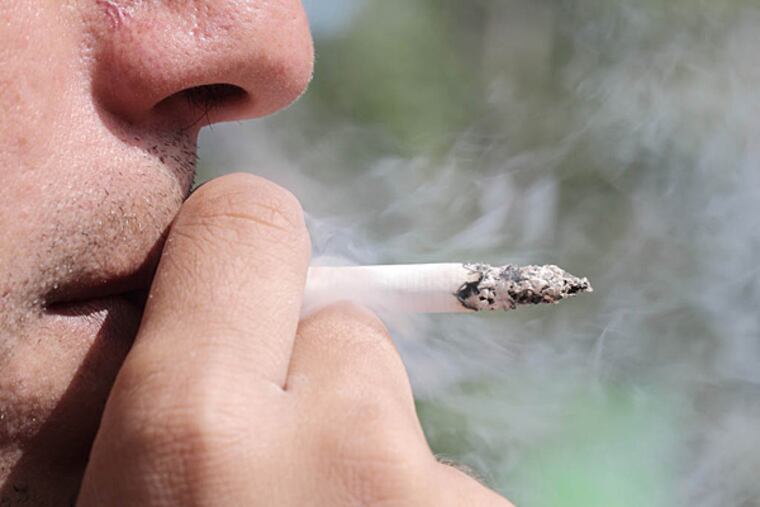Pa. Senate delays cigarette tax, fate uncertain
HARRISBURG - A bill allowing Philadelphia to impose a new cigarette tax to help fund the city's cash-strapped schools is again up in the air.

HARRISBURG - A bill allowing Philadelphia to impose a new cigarette tax to help fund the city's cash-strapped schools is again up in the air.
The Republicans who control the state Senate made changes to the legislation in the eleventh hour early Tuesday evening, delaying implementation of the $2-per-pack tax and setting the stage for Philadelphia public schools to possibly not open on time.
"This is terrible for schoolchildren, for teachers, for parents, and for the taxpayers in the city of Philadelphia," said Mayor Nutter. "We are caught in a vortex of political hell with no way out."
The tax was expected to raise just over $80 million in the first full year. This year, it would also help avert 1,300 layoffs and class sizes swelling to at least 40.
Nutter said he was told that tobacco lobbyists were "weighing in and literally trying to take away money from the schoolchildren in Philadelphia."
Back in Harrisburg to vote on a handful of budget-related bills, the Senate voted, 43-5, to amend the legislation to, among other things, make the cigarette tax one that would end after five years.
School Superintendent William R. Hite Jr. said that ending the tax after five years "throws us back into uncertainty" now and in the future.
"Ending the tax in five years will exacerbate our structural deficit, complicate our long-term planning efforts, and make it harder to access the capital markets, and strip our schools of educational services and supports," Hite said.
Senators also added other items to the bill, including language allowing certain municipalities to levy hotel taxes, and permitting certain communities to provide tax incentives for economic development.
Because of those changes, the bill must go back for approval in the House, where a spokesman for the Republicans who control the chamber said it would be "very difficult" to muster the votes to approve the Senate's last-minute add-ons.
House GOP spokesman Steve Miskin said Republican legislators were concerned that the proposed hotel taxes and tax incentives would cost the state tens of millions of dollars.
"We certainly preferred legislation focused on quality education for the kids in Philadelphia," said Miskin, adding that there was no immediate timetable for the House to return to take up the measure.
The House broke for the summer last week and is not officially scheduled to return until mid-September.
Nutter and other Philadelphia Democrats were caught by surprise by the Senate's move Tuesday to make the tax temporary.
Majority Leader Dominic Pileggi (R., Delaware) said in an interview that several members of his caucus suggested ending the tax after five years, but declined to say who those members were.
Pileggi, who voted for the change, said he believed the request was reasonable.
"That is something that should be examined after five years to see what impact it has had on revenues collected. Is it stable? It is declining, is it growing, what effect has it had on neighboring counties," said Pileggi.
He added: "I think that it is a fair [change], to see how this has worked out in practice over five years rather than just putting it on automatic pilot."
After the Senate vote Tuesday, a frustrated Nutter urged quick action on the cigarette tax.
"We have to figure out a way to get it out of this Ping-Pong effect," said Nutter, referring to how the House and Senate have volleyed the bill back and forth in recent weeks.
Without a cigarette tax, he said, "schools will not open on time."
Proponents of the tax, including Philadelphia Democratic Sens. Anthony Hardy Williams and Vincent Hughes, agree that implementing the levy quickly is paramount.
Hughes, the ranking Democrat on the Appropriations Committee, said the city is slated to lose out on $1.6 million for every week of delay.
"That is untenable," said Hughes.
Gov. Corbett had said that he would sign a cigarette tax for Philadelphia if the bill were to reach his desk.
As important as city leaders have said the tax is to the future of city schools, it does not cover the School District's entire $93 million budget gap for the coming school year. And even in the best-case scenario, city schools would be funded at the level they were this past term.
Budget uncertain, too
The Philadelphia cigarette tax is not the only issue in limbo.
Corbett has yet to say whether he intends to sign the $29.1 billion budget the legislature sent him last week.
The governor has been unhappy with the legislature's failure during budget negotiations to act on a separate bill that tops his list of priorities: reining in the skyrocketing cost of public employee pensions.
All Corbett has said is that he is "reviewing" the budget blueprint the legislature sent. He has until Friday to make a decision. Among his options are vetoing the budget or striking certain expenditures in it. If Corbett takes no action, the budget automatically becomes law.
Corbett also has to decide whether to sign another budget-related bill called the fiscal code, which the Senate also approved Tuesday. There is controversy surrounding the fiscal code this year because it contains what some have described as earmarks purposely shrouded in secrecy.
717-787-5934
@AngelasInk